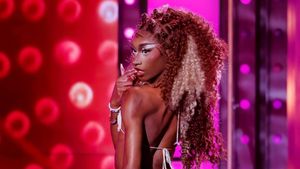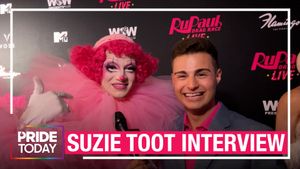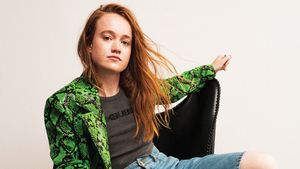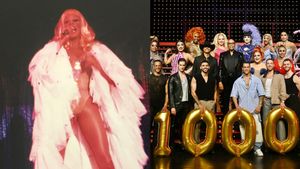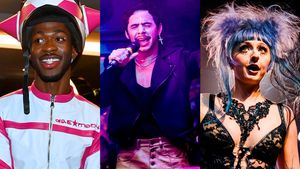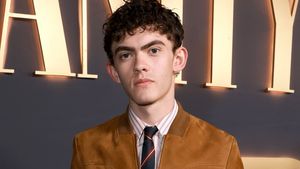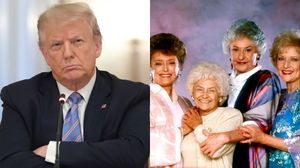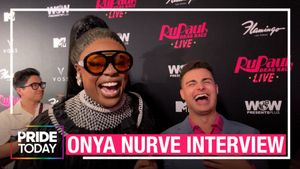
CONTACTAbout UsCAREER OPPORTUNITIESADVERTISE WITH USPRIVACY POLICYPRIVACY PREFERENCESTERMS OF USELEGAL NOTICE
© 2025 Pride Publishing Inc.
All Rights reserved
All Rights reserved
By continuing to use our site, you agree to our Private Policy and Terms of Use.
When I was in grad school at Vanderbilt in the '90s, Thursday night was "Disco Night" at Nashville's Underground dance club. One particular night, working my boogie shoes to the Bee Gees' classic "You Should Be Dancing," I finally understood the lyrics: "What you doin' and you're laying on your back? You should be dancing!"
Now, granted, that call to action is not exactly the stuff of Joni Mitchell or Bob Dylan, but it is a question worth considering. And, understanding the lyrics and gyrating among a sea of fellow-partiers, I was proud of myself for not being home laying on my back--I was dancing! And dancing and disco, it turns out, are not trivial things.
Scholar and former DJ Alice Echols has given disco three-hundred pages of consideration in her absorbing, entertaining bookHot Stuff: Disco and the Remaking of American Culture (Norton, $26.95). Echols blends the scholarly with the appreciatory: she is here to praise disco, not to bury it. She sees it as playing an important role in the important social transformations in the 1970s. Disco comes straight from the places of America's biggest cultural anxieties: the feminist movement, race relations, and especially gay liberation.
"The central paradox of disco," she says, "is that, for music so lyrically slight--'get down tonight' being typical--it packed such a cultural, social, and political wallop. Disco destabilized racial, gender, and sexual conventions and rules, yet unlike so much '60s music, it did not strain to be meaningful."
But behind the music, other things were happening. "Disco offended people across the political spectrum," Echols says. The title, Hot Stuff, is meant to "signal disco's 'hotness.' It was attacked for being both too gay and too straight, too black and too white, oversexed and asexual, leisure class and leisure-suited/loser class. While many on the left disparaged its open embrace of commercialism, social conservatives like Anita Bryant attacked it as 'pornographic' and pro-gay."
Echols lived through this era as a participant and a budding cultural studies scholar. "In my own experience, walking into a lesbian bar in Albuquerque in 1973 was one of the scariest things I had ever done, but it was also terribly exciting. It's where I began to see the possibilities, where I experienced the exhilaration of coming out, of being gay. This consciousness wasn't forged at a march but at a bar!" Then, a few years later, while she "was practicing dissertation-avoidance" in a PhD program at the University of Michigan, Echols took her interest in music and put it to work. She started DJ'ing at the Rubaiyat, which she describes as "a flytrap for the fringe" with a crowd that included "flight attendants and librarians--a good number of them gay men--and lesbian-feminist bus drivers, some of whom moonlighted as prostitutes at a nearby massage parlor." With a crowd like that, how could what was going on inside the club not have been transformational?
How does Echols locate social and political significance in disco, given its admittedly superficial elements? She digs deep and goes through the music into the times. And the music was in the dance club, where these changes were occurring--changes in look, in individual behavior, and in community. These changes, Echols argues, moved from the dance floor into the streets. "One can see, viscerally and palpably, the way disco transformed the lives of gay men in that era--the ways they experienced each other and themselves."
[Here are some of the most enduring disco anthems]
The "clone" look emerged in this era, and it was exemplified, outrageously, by the Village People. Today, it's hard to imagine that anyone could watch these men in macho drag sing about fun at the YMCA or in the navy without clocking them as gay, but alas, plenty of straight folk seem to have missed it. Echols' theory is that "straight people didn't view gay men as in any way credibly masculine, so they couldn't imagine that these 'macho men' could be gay. It's the same as the dynamic of people being shocked by Rock Hudson. Any conventionally masculine man just wasn't imaginably gay to straight eyes."Echols does not depict gay macho as unequivocally positive. She points out that it "encouraged stigmatizing sissiness. It certainly put disco's only genuinely gay star in a difficult position. Sylvester was operating within an R&B tradition of flamboyant queerness--think of Little Richard--but he felt out of step with the seventies' macho men who looked down their noses at effeminate men like himself."
Nonetheless, gay disco offers a great example of how music doesn't just reflect change, but actually makes it as well. In Echols's view, "It's not surprising that change should happen on a dance floor because dancing between men had been forbidden. As that reality changed, the dance floor became a site of social and self transformation. Although dancing was largely understood as 'feminine,' it's through dancing that gay men worked out a different relationship to masculinity. The ear-shattering volume and bass-driven sonics of disco encouraged physical intimacy and sexual straightforwardness that was less prevalent in, let's say, a piano bar. In a disco you had to dispense with the usual formalities and chit-chat. The sweatbox conditions at gay discos also encouraged stripping to the waist, which in turn made working-out pretty much obligatory. The buff body was critical to the reconfiguring of gay identity and desire. Before, gay men had often been 'hunters after the same prey,' as gay clubber and record executive Mel Cheren put it, 'rather than allies or prospective partners.' Now, gay rather than heterosexual men became the embodiment of masculinity and the fantasized object of desire for one another. Novelist Edmund White described it this way: 'We're brothers,' was the feeling. 'We're the men we've been looking for.'"
But what all these "dancing machines" were doing at the discos, in backrooms and bathhouses, and at home before the sun came up have led some social historians to a moralistic critique of the disco era. Echols refutes the notion that the ethos of disco led, inevitably, to the plague years in the eighties. "One of the things I was trying to write against was the censorious notion that gay male culture in the seventies brought on AIDS. The dominant view is that disco was so hedonistic and so individualistic and that it was based in a kind of sexual selfishness. What I emphasize instead is the communities that were forged on dance floors. For me, disco was undeniably a site of community making and building." It is this community aspect that helped transform the early AIDS years from panic into protest and care-taking. Echols believes that "the kinds of networks that were built up on the dance floor are the very networks that were called upon during the AIDS crisis."
Echols does not claim that all these trends or transformations were wholly positive. There was plenty of sexism in the clubs; there was racism. The doors of clubs like West Hollywood's Studio One were not always open to women or to people of color, even if they had three or four picture IDs. Despite some of these shortcomings, though, Echols remains philosophical and realistic: "I do think that there were ways in which the development of that kind of gay masculinity was problematic, both for non-macho men and for women. But that's the way that change works, isn't it? It is never quite the way we would want it--there were certainly downsides, even as there was 'progress.' Yes, it was flawed, but when you look back at that culture, it was surprisingly radical."
So it turns out, we weren't just dancing machines; we were dancing together, sweating, heating it up, and finding new ways to live and to love. Not trivial at all, as Echols's work shows and as all of us dancing queens suspected all along.
Chris Freeman teaches English and Gender Studies at USC Dornsife College. He lives in Los Angeles.
From our Sponsors
Most Popular
31 Period Films of Lesbians and Bi Women in Love That Will Take You Back
December 09 2024 1:00 PM
18 of the most batsh*t things N.C. Republican governor candidate Mark Robinson has said
October 30 2024 11:06 AM
True
These 15 major companies caved to the far right and stopped DEI programs
January 24 2025 1:11 PM
True
Latest Stories
Have LGBTQ+ rights in Florida reached a turning point? Advocates have hope
March 23 2025 12:35 PM
Fireworks in D.C. courtroom as judge hears DOJ request to undo block on trans military ban
March 21 2025 3:04 PM
True
Notes from a gender clinician
March 21 2025 6:00 PM
Kentucky Gov. Andy Beshear vetoes anti-DEI bill
March 21 2025 1:50 PM
Federal judge will hear last-minute Trump admin request to undo block on trans military ban
March 21 2025 10:42 AM
Disney shareholders vote overwhelmingly to continue in Human Rights Campaign index
March 21 2025 5:44 PM








































